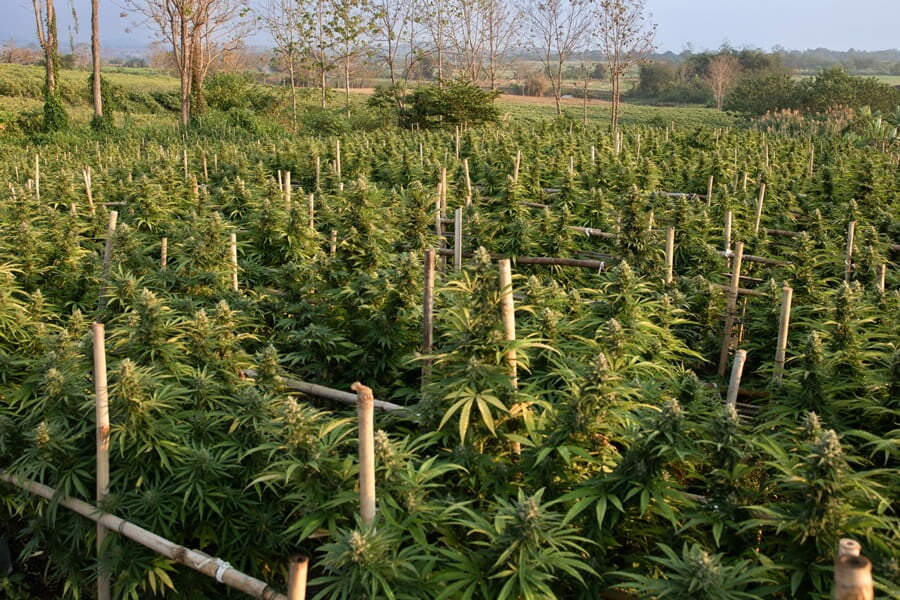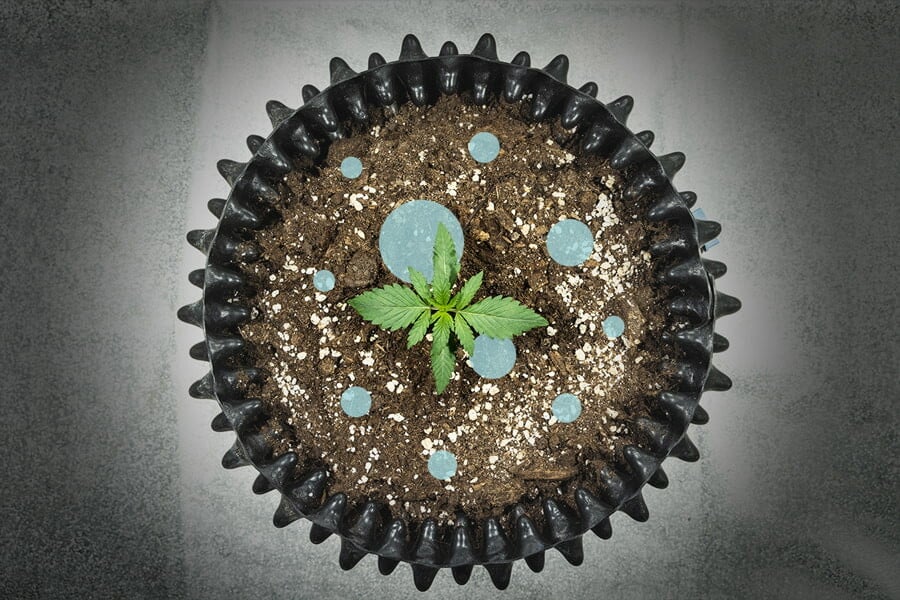.
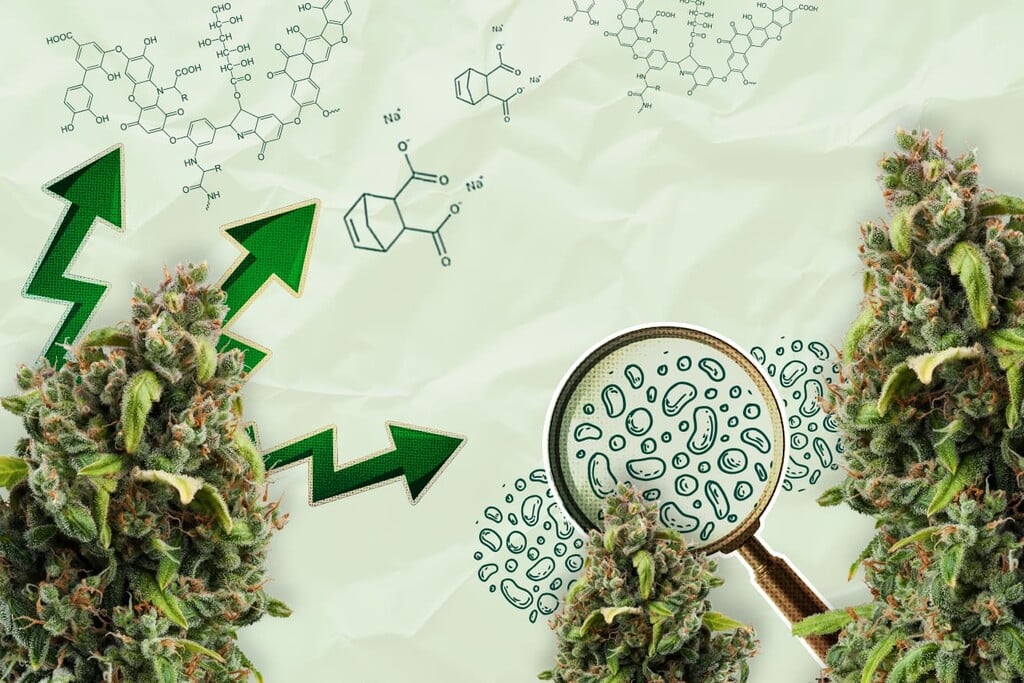
Organic Acids: The Future of Cannabis Biostimulants?
The global cannabis industry is booming, with revenue projected to hit $75B by 2029. Amongst the most promising innovations, biostimulants are gaining traction for their natural approach to enhancing plant growth. From microbial inputs to organic acids, these tools help growers boost yield, quality, and sustainability.
Contents:
- What are cannabis biostimulants?
- The role of organic acids in cannabis growth
- Current trends and innovations in cannabis biostimulants
- The future of cannabis biostimulants: what to expect?
- Practical guide: how to use biostimulants in cannabis cultivation
- Cannabis biostimulants: paving the way towards an organic future
Poised to reach a worldwide revenue of over $68 billion[1] in 2025, the global cannabis industry is set to swell to $75 billion by 2029. With constant innovation in this burgeoning sector, the industry has given rise to all sorts of products. Amongst them, biostimulants are gaining some serious traction, especially with growers who favour organic and sustainable approaches to growth enhancement.
The European Biostimulant Industry Council (EBIC) estimated[2] a market value of up to $2 billion in 2022, along with an annual growth rate of 10–12%. While cannabis biostimulants are an emerging trend, conventional agriculture has already put these technologies to use—with great effect. Entire archives of scientific research papers also document their effectiveness.
Below, we’re going to guide you through the new and exciting landscape of cannabis biostimulants, with a particular focus on organic acids. By the time you get to the bottom of the page, you might just change the way you grow weed forever!
What Are Cannabis Biostimulants?
The very name “biostimulant” hints at the nature and function of these products, with “bio” referring to “life” and “stimulant” connoting accelerated growth.
According to European Union regulations, plant biostimulants are defined[2] as “a product stimulating plant nutrition processes independently of the product’s nutrient content with the sole aim of improving one of the following characteristics”. These characteristics include:
- Nutrient use efficiency
- Tolerance to abiotic stress
- Quality traits
- Availability of confined nutrients in the soil or rhizosphere
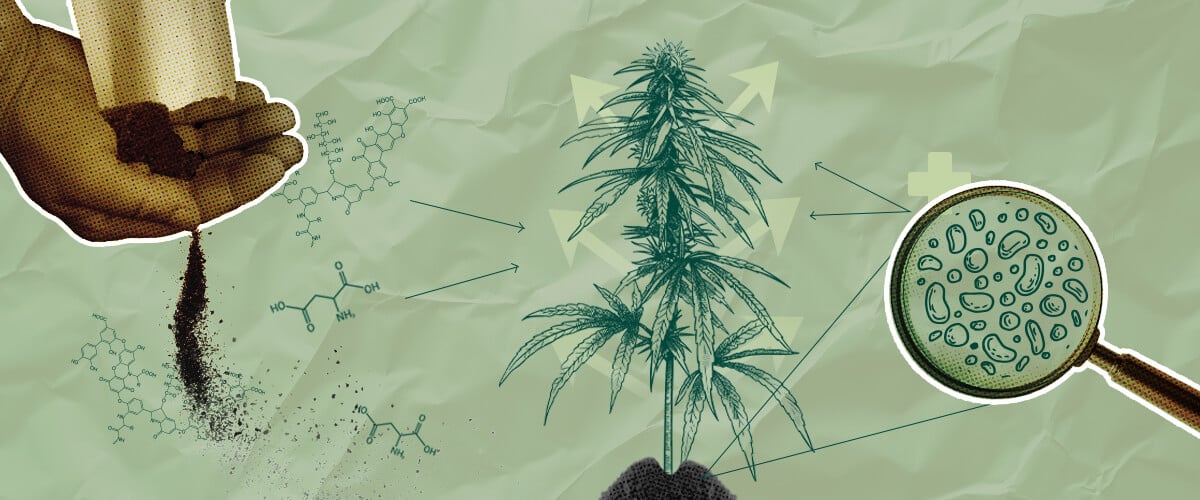
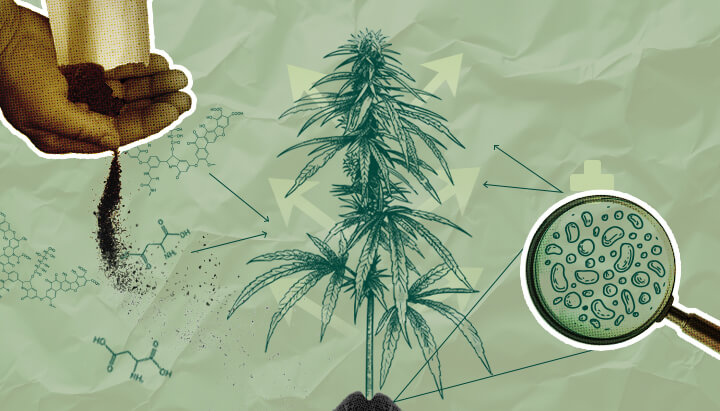
Another definition[3], formulated by Oleg Yakhin in his 2017 Frontiers article, describes plant biostimulants as, defined plant biostimulants as “a formulated product of biological origin that improves plant productivity as a consequence of the novel, or emergent properties of the complex of constituents, and not as a sole consequence of the presence of known essential plant nutrients, plant growth regulators, or plant protective compounds”.
As you can see, biostimulants don’t kindle plant growth in the same way as fertilisers, which provide a suite of macronutrients and micronutrients that plants need to fulfil physiological processes. Rather, living organisms, or their products, are applied to help plants tap into the nutrients that already exist around them in the soil, and to enable them to better tolerate environmental stress.
Microbial Biostimulants
Microbial biostimulants consist of whole organisms or their spores. They are also sometimes classed as biofertilisers depending on their mechanism of action and interactions with plants. Research remains relatively early in this area, considering the vast amount of potential beneficial microbes found in nature. However, certain fungi and bacteria have shown promise.
Inoculating cannabis roots with mycorrhizal fungi may help to enhance nutrient uptake and stress management. These organisms fuse with cannabis roots and, in exchange for exudates such as sugars and amino acids, act as an extension of the root system.
Research[4] published in 2022 shows that the application of mycorrhizal fungi has the potential to enhance both the growth and cannabinoid content of hemp.
Trichoderma, another group of fungi, are also gaining traction as cannabis biostimulants. A 2021 paper[5] suggests that Trichoderma enhances the inoculation of roots by mycorrhizal fungi. The combination of both biostimulants in tandem showed positive increases in flower number, yield, and CBD content in hemp plants.
Algae also show promise as plant biostimulants. Dr James White, a renowned endophyte researcher, has found that some forms of algae essentially work as a “taxi service” in the soil, where they pick up nitrogen-containing bacterial cells and ferry them into plant roots for processing.
A 2022 study[6] tested spirulina algae on the growth and heavy metal uptake of hemp plants in the context of bioremediation. The authors note that “spirulina acts as a growth promoter of hemp plants”.
Humic and Fulvic Acids
Humic and fulvic acids are non-living biostimulants. As organic acids, they are carbon-based compounds produced through the decomposition of plants and animal matter in the soil. However, once organic matter reaches this stage of breakdown, it remains largely resistant to further decomposition by microbes.
Overall, humic substances confer several benefits to plant and soil health, including:
- More microbes in the soil: Humic substances enhance the number of microorganisms in the soil, which has a knock-on effect on improved nutrient cycling and organic matter decomposition.
- Enhanced cation exchange capacity: This term simply denotes the amount of nutrients the soil can hold onto, improving nutrient access and uptake for plants.
- pH buffering: This refers to the ability of the soil to resist pH fluctuations, allowing it to remain in the sweet spot desired by most plants.
- Improved soil structure: Better soil texture improves aeration and drainage—two factors that hold significant sway over plant health and development.
Amongst the humic substances, humic acids have been found to boost photosynthesis—the cornerstone of plant growth and productivity. The foliar application of humic acids on turfgrass, for example, significantly increased[7] the production of photosynthetic pigments and carotenoids.
Humic acids also appear to manipulate hormone pathways in plants. Studies[2] show they affect the expression of around 1,000 genes in select plants and influence a great number of metabolic pathways relating to photosynthesis, cell metabolism, and plant hormones.
Fulvic acids also demonstrate promise as organic acid biostimulants for weed plants. The available literature mostly documents studies that administer these substances alongside other biostimulants, including humic acids and seaweed extracts. However, some studies have tested them in isolation.
For example, a 2021 paper[8] found fulvic acids to decrease germination times, reduce disease-inflicted damage to sprouts, and boost crop yield and quality in spring cereals and sugar beet.

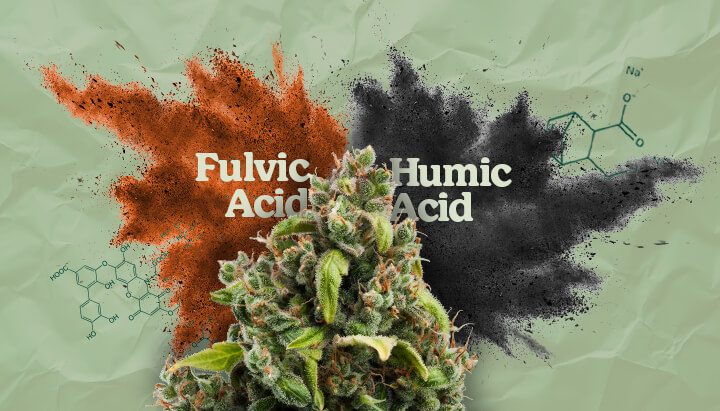
Amino Acids & Peptides
Produced through the hydrolysis of waste biomass, protein hydrolysates (PHs) are a sustainable source of biostimulants. These substances break down into amino acids (the building blocks of proteins) and peptides (short chains of amino acids). These degradation products modulate plant growth and vitality through several different mechanisms, including by acting in a similar fashion to plant hormones.
The foliar application of PHs results in the proliferation[9] of bacteria that live on the surfaces of plants. They also increase the density and length of lateral roots and spur enzymatic activity.
The Role of Organic Acids in Cannabis Growth
Various types of biostimulants are projected to play a future role in the sustainable production of cannabis, including organic acids.
While plenty of literature touts the benefits of organic acid biostimulants in agriculture as a whole, few studies have assessed their effects in cannabis. However, it’s likely that they work in a similar way to improve nutrient uptake and key plant growth parameters.
So, how exactly do organic acids benefit cannabis growth? Research from 2024 shows that the application of humic acid, both in isolation and alongside biofertilisers, increased[10] cannabis plant height, chlorophyll content, photosynthetic efficiency, and aboveground biomass. The research team responsible for these findings hypothesise that humic acids work to stimulate the activity of microbial biofertilisers, creating a synergy between the two organic inputs.

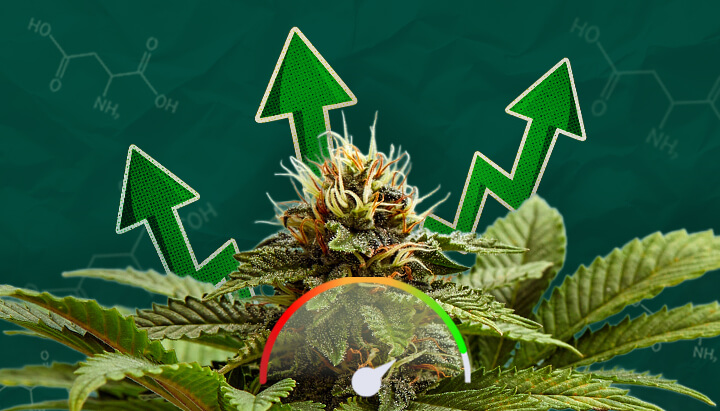
Current Trends and Innovations in Cannabis Biostimulants
Beyond the biostimulants already widely in use in agriculture, and those gaining ground in cannabis cultivation, several lesser-known innovations are emerging that offer growers even more choice when it comes to enhancing plant growth.
Emerging Biostimulant Technologies
The idea of nanoparticles and nanomaterials[11] as plant biostimulants is gaining ground in some scientific circles. When applied in small quantities, these substances boost plant growth, modify the nutritional quality of crops, and help them to tolerate stress.
Other than just improving the bioavailability of nutrients in the soil, nanotechnology could work as a vector to release timed and controlled quantities of nutrients and other inputs into the soil.
While exciting, these technologies are destined for patented production and expensive centralised applications. Many cannabis growers prefer a more grassroots approach to growing, which is helping trends such as fermented plant extracts (FPEs) pick up steam.
FPEs are simply liquid solutions derived from the fermentation of plants via the action of beneficial microbes, most commonly lactic acid bacteria. Easy to make at home, they enhance soil ecosystem functionality[12], support microbial interactions, improve nutrient availability, and bolster plant stress tolerance.
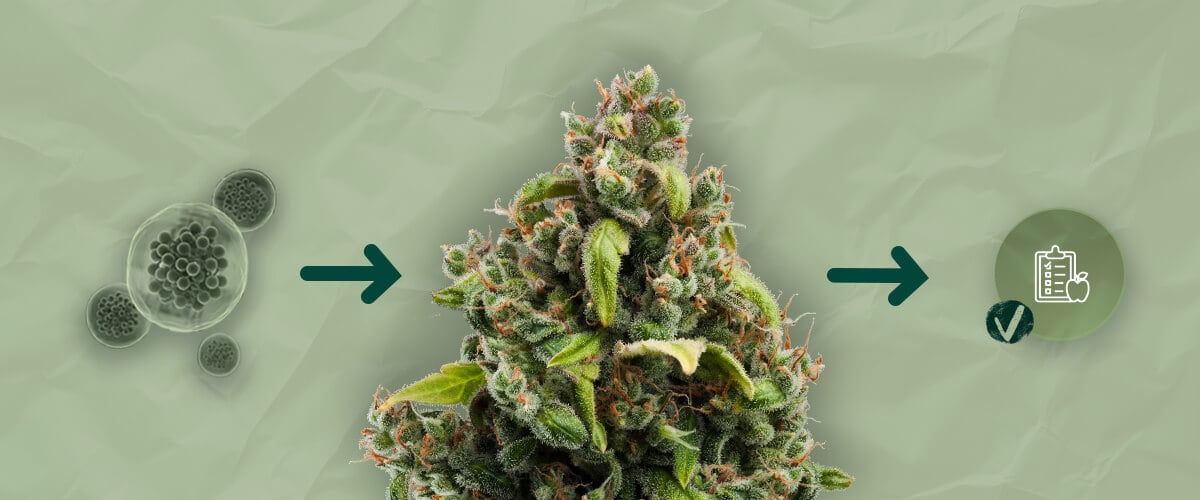
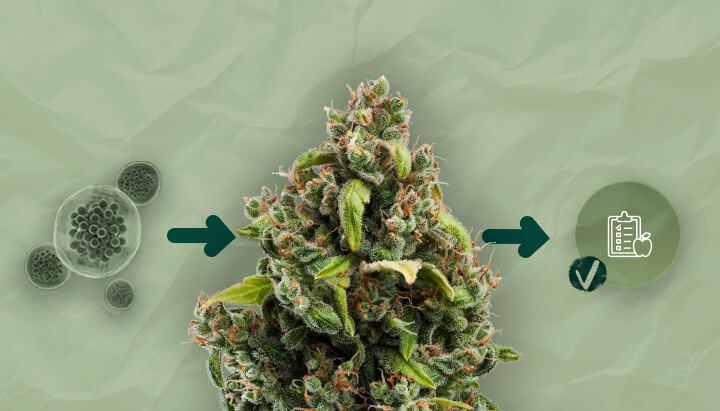
Adoption by Cannabis Growers
Biostimulants in cannabis cultivation are gaining momentum, with licensed cultivators integrating these products into their practices to enhance yield and quality.
Likewise, some home growers are increasingly opting to purchase biostimulants from leading companies, while others are making their own.
As more scientific research becomes available, the use of both microbial and non-living plant biostimulants is kindling a tangible excitement within the world of weed, providing a new and more natural way to grow the herb.
The Future of Cannabis Biostimulants: What to Expect?
As cannabis biostimulants continue to gain ground, we can anticipate explosive market growth, reactionary and supportive regulatory changes, and a surge in research and development.

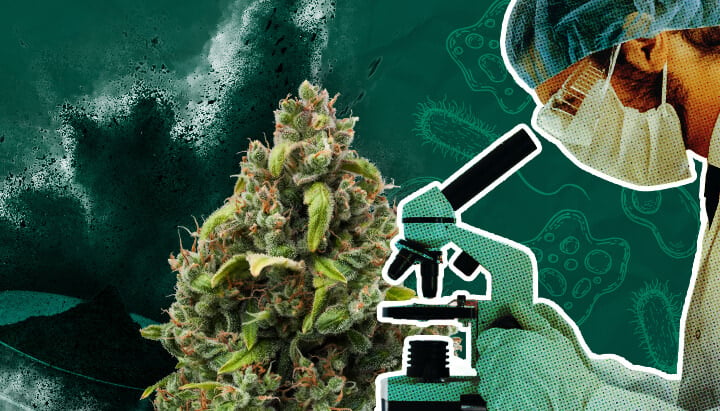
Regulatory Changes and Market Growth
As the cannabis industry continues to expand, regulatory frameworks are evolving to ensure product safety and environmental sustainability. There is a growing emphasis on reducing the use of synthetic inputs, which may lead to increased adoption of organic biostimulants.
Market analyses predict substantial growth in the biostimulant sector, driven by the demand for sustainable agricultural practices and high-quality cannabis products.
Research and Development in Biostimulants
Ongoing research is crucial to unlocking the full potential of biostimulants in cannabis cultivation. Recent studies have focused on understanding the specific mechanisms through which organic acids and other biostimulants enhance plant growth.
For example, research into the role of organic acids produced by soil bacteria has provided insights into their ability to solubilise phosphate, thereby improving nutrient availability for plants.
Going forward, we can expect to see more technologically refined products become available, as well as AI-integrated quantitative tools that allow growers to gauge the microbial composition of their soil.
Practical Guide: How to Use Biostimulants in Cannabis Cultivation
So, what are the best biostimulants for cannabis? And how should you go about using them in your own garden? The answers to these questions aren’t set in stone but vary depending on your particular circumstances.
Choosing the Right Biostimulant
Selecting the best biostimulant all depends on your goal. To enhance seedling health and improve nutrient uptake during veg, apply Trichoderma and mycorrhizal fungi.
During the vegetative phase, use organic acids to promote healthy root development and enhance soil structure.
Moreover, to enhance the stress tolerance and resilience of your plants, apply amino acids and peptides throughout the growing cycle. They are especially useful during periods of drought, pH imbalance, and excessive heat.
Application Methods
The application of cannabis biostimulants falls into two main categories: foliar application and soil drench.
Substances like seaweed extracts and mycorrhizal fungi work best when applied to the soil, where they help to boost nutrient cycling and uptake.
On the other hand, organic acids and amino acids are great for foliar application, where they gain swift entry into plant tissues.
Cannabis Biostimulants: Paving the Way Towards an Organic Future
Cannabis biostimulants are set to become a major component of the marijuana industry. Both in the context of commercial grows and small home operations, they enhance plant vigour and productivity while reducing dependency on lab-made inputs.
These formulas go hand in hand with organic fertilisers, with the former enhancing the uptake and effectiveness of the latter. While some biostimulants are the products of laboratories, others are easy to make at home. For this reason, they’re yet another input that allows growers to become more self-sufficient and sustainable.
Organic acids will likely drive this new approach. As entirely natural products, they show great potential in improving soil health and plant productivity through simple foliar and soil drench applications.
- https://www.statista.com/outlook/hmo/cannabis/worldwide
- https://www.mdpi.com/2218-273X/11/8/1096#B5-biomolecules-11-01096
- https://www.frontiersin.org/journals/plant-science/articles/10.3389/fpls.2016.02049/full
- https://www.researchgate.net/publication/362258252_Enhancement_of_growth_and_Cannabinoids_content_of_hemp_Cannabis_sativa_using_arbuscular_mycorrhizal_fungi
- https://pmc.ncbi.nlm.nih.gov/articles/PMC7998984/
- https://www.sciencedirect.com/science/article/pii/S2666765721001150
- https://www.actahort.org/books/1131/1131_6.htm
- https://www.sciencedirect.com/science/article/abs/pii/S0013935121001183
- https://www.frontiersin.org/journals/plant-science/articles/10.3389/fpls.2019.00060/full
- https://pubmed.ncbi.nlm.nih.gov/38532457/
- https://www.mdpi.com/1422-0067/20/1/162
- https://chembioagro.springeropen.com/articles/10.1186/s40538-025-00748-4





























